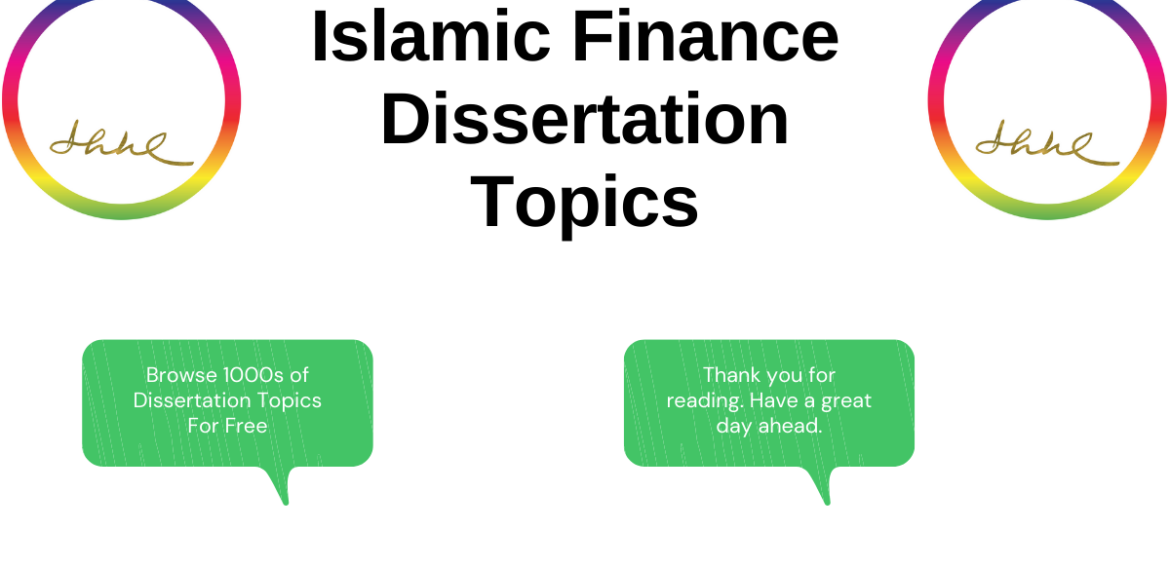Islamic Finance Dissertation Topics
Researchers are needed to dig more into Islamic finance and banking as it is a new field of study. For your convenience, we’ve prepared a database of hundreds of free dissertation themes. You can pick the islamic finance dissertation topic of your choosing.
Editingarsenal has compiled a list of some of the most popular and common dissertation topics from a variety of academic disciplines, so you can pick and choose what to write about. If you need dissertation editing assistance , don’t hesitate to contact one of our qualified and experienced editors and proofreaders.
General Topics
- Compare and contrast deposits made by customers of Islamic and conventional banks.
- A comparison of the funding sources of Islamic banks by country or region.
- A examination of Islamic banking practises in various nations throughout the world.
- Invention of Islamic Financial Instruments.
- Banker-customer relationships in both conventional and Islamic financial institutions.
- The profit-sharing scheme of an Islamic bank.
- Interbank standards for Islamic banks are proposed.
- Developing Islamic financial instruments to aid in cross-border transactions between financial institutions.
- Do mergers and acquisitions have an impact on the efficiency of Islamic banks?
- A country-by-country look at the introduction of Islamic banks.
- Islamic financial institutions’ profitability and risk management.
- Analyses of derivatives by Islamic banks.
- A comparative study of Islamic finance’s use of financial engineering.
- Islamic finance requires financial engineering for its future.
- Corporate social responsibility (CSR) and profitability are important considerations for Islamic banks.
- What sets corporate governance apart from other forms of banking, such as conventional and Islamic?
- An examination of how Islamic and conventional banks fared during and after the recent financial meltdown.
- Customer relationship management (CRM) in an Islamic bank – (any bank or country can be used as a case study).
- They are less susceptible to credit crises in Islamic banks.
- The past, present, and future.
- A country or region’s efforts to establish or expand Islamic banking.
- Development, Evolution, and Prospects of Islamic Banking in (country).
- A variety of challenges confront Islamic banks.
- Benefits and drawbacks of the Arabic lexicon.
- Islamic financial knowledge and education management.
- Islamic principles apply to both banking and the management of knowledge.
- Islamic banking’s knowledge management system.
- Skills and personnel are in short supply in Islamic financial organisations.
- In the Islamic education field, employers prefer online degrees to traditional ones.
- There is an increasing need for Islamic financial education.
- The Islamic banking/IFI industry’s efforts to standardise or harmonise Fatwas.
- (Countryeconomic )’s growth and the use of Islamic finance
- Infrastructure development in impoverished countries can benefit from the Islamic economy.
Islamic Economics Topics
- The fiscal policy of the government Islam’s economic system
- Growth of a country and Islamic banking.
- (Countryeconomic )’s growth and the use of Islamic finance
- Increasing inflation in the Islamic economy.
- Is there a way for an Islamic economy to fight inflation?
- Infrastructure development in impoverished countries can benefit from the Islamic economy.
- How the human race makes decisions in an Islamic economic system where resources are scarce.
- Is the Islamic economy suffering from a lack of resources?
- From the standpoint of Islamic economics, the value of an alternative.
- Combating the adverse effects of global warming.
- Growth of small and medium-sized businesses in Islamic countries.
- Islamic economics and Adams Smith are compared in this paper.
- In the Islamic economy, the movement of workers.
- Islamic economics and joblessness.
- Unemployment can be reduced by adopting a Muslim-based economic system.
- In an Islamic economy, joblessness is a problem.
- Poverty alleviation is a top concern in the Islamic economy.
- An answer to the world’s economic woes based on the Islamic economic model
- Trade in conformity with Islamic economic principles.
- The Islamic economic paradigm allows for currency appreciation and depreciation.
- Sharia-compliant microfinance
- How does the Islamic economy’s market equilibrium become determined?..
- Socioeconomic progress in the Islamic and socialist countries is compared.
- Islamic and capitalist economies are compared in terms of social progress.
- Specifically, how Islamic economic concepts contribute to increased productivity.
- Its contribution to financial stability and macroeconomic growth in the Islamic economy.
- An important characteristic of the Islamic economic system is the freedom of capital movement.
- The Islamic financial system and economic growth.
- The expansion of the economy and the Islamic monetary system
- Poverty alleviation and Islamic financial institutions
- The economic functions of the Islamic financial market.
- How may Islamic banks contribute to economic growth?
Islamic Capital Market Topics
- How does an Islamic financial market function?
- Investing from an Islamic perspective.
- Islamic financial market growth and development.
- Investments made in the Islamic capital market.
- Identifying equities that are eligible for Islamic investment by sifting through them.
- Sukuk.
- Valuation of a sukuk.
- Developing a variety of sukuk to fulfil the needs of Islamic banks as well as governments.
- Sukuk issued as a form of corporate social responsibility are green.
- Sukuk and conventional bonds are compared in terms of interest rates and profit rates..
- Practices for managing the risk of Sukuk.
- Some concerns related to Sharia-compliant Sukuk structuring
- Sukuk market growth and country’s economic indicators.
- As a comparison, look at the returns on Sukuk and regular bonds.
Microfinance Topics
- How does an Islamic financial market function?
- Investing from an Islamic perspective.
- Islamic financial market growth and development.
- Investments made in the Islamic capital market.
- Identifying equities that are eligible for Islamic investment by sifting through them.
- Sukuk.
- Valuation of a sukuk.
- Developing a variety of sukuk to fulfil the needs of Islamic banks as well as governments.
- Sukuk issued as a form of corporate social responsibility are green.
- Sukuk and conventional bonds are compared in terms of interest rates and profit rates..
- Practices for managing the risk of Sukuk.
- Some concerns related to Sharia-compliant Sukuk structuring
- Sukuk market growth and country’s economic indicators.
- As a comparison, look at the returns on Sukuk and regular bonds.
Islamic Finance and Property
- Islamic funding for property.
- Islamic Shariah Board of Inquiry to Compare Conventional and Islamic Financing of Real Estate
Islamic Bank Sharia’a Boards
- In Islamic banks, religious boards or Sharia’a councils have a significant effect.
- How effective are sharia audits?
- Unification of Islamic banking fatwas.
- The Islamic banking/IFI industry’s efforts to standardise or harmonise Fatwas.
Islamic Mortgage Financing
- As a possible solution to the current credit crisis, Islamic mortgages are being investigated.
- Islamic banking is feeling the effects of the credit crunch.
- Islamic Banking and the Credit Crisis: Assessing the Effects.
- They are less susceptible to credit crises in Islamic banks.
- The past, present, and future.
- A country or region’s efforts to establish or expand Islamic banking.
- Development, Evolution, and Prospects of Islamic Banking in (country).
- A variety of challenges confront Islamic banks.
- Benefits and drawbacks of the Arabic lexicon.
- Islamic financial knowledge and education management.
- Islamic principles apply to both banking and the management of knowledge.
- Islamic banking’s knowledge management system.
- Skills and personnel are in short supply in Islamic financial organisations.
- In the Islamic education field, employers prefer online degrees to traditional ones.
- There is an increasing need for Islamic financial education.
Marketing, Customer Loyalty, and Relationships
- The importance of a company’s relationship with its customers, as well as its marketing approach
- Customer relationship management (CRM) in an Islamic bank – (any bank or country can be used as a case study).
- An inquiry into identifying Islamic banks’ competitive strategies: a comparison with conventional banks focuses on customer loyalty in Islamic banks.
- Developing a methodology for Islamic banks to reward its customers for their patronage.
- Islamic financial organisations’ branding and marketing efforts.
- Customer retention is crucial for Islamic banks.
- Islamic banking windows in regular banks: client impressions of Islamic credit cards.
- Investigating Islamic banks’ use of customer relationship management (CRM).
- A global view of the shift from conventional to Islamic banking.
- Islamic banking marketing that is morally correct.
Islamic Finance Topics
- The performance of Islamic and conventional banks is contrasted in a specific country.
- Measuring the productivity of Islamic banking.
- Industrial lending by Islamic banks.
- Measuring the Performance of Islamic Banks.
- The performance of Islamic banks in times of financial crisis.
- A study comparing the performance of Islamic and conventional banks during and after the financial crisis.
- Corporate social responsibility in the Islamic perspective Topics
- Companies’ social responsibility and Islamic financial institutions.
- Reduced poverty through Islamic banking.
- A look into Islamic banks’ corporate social responsibility (CSR)
- Corporate social responsibility (CSR) and profitability are important considerations for Islamic banks.
- What sets corporate governance apart from other forms of banking, such as conventional and Islamic?
- Derivatives based on Islamic law Islamic banks use hedging tactics (unique to a country or region).
- Islamic banks’ use of hedging tactics.
- The payback for profit rate swaps and interest rate swaps is the same, yes or no.?
- Identifying Salam-based Islamic products from conventional forward or futures markets.
- Product development in the Islamic options market.
- Implementing hedging strategies in Islamic financial markets based on the Juala or Bay Al Arbun agreements.
- A comparative study of Islamic finance’s use of financial engineering.
- Islamic finance requires financial engineering for its future.







